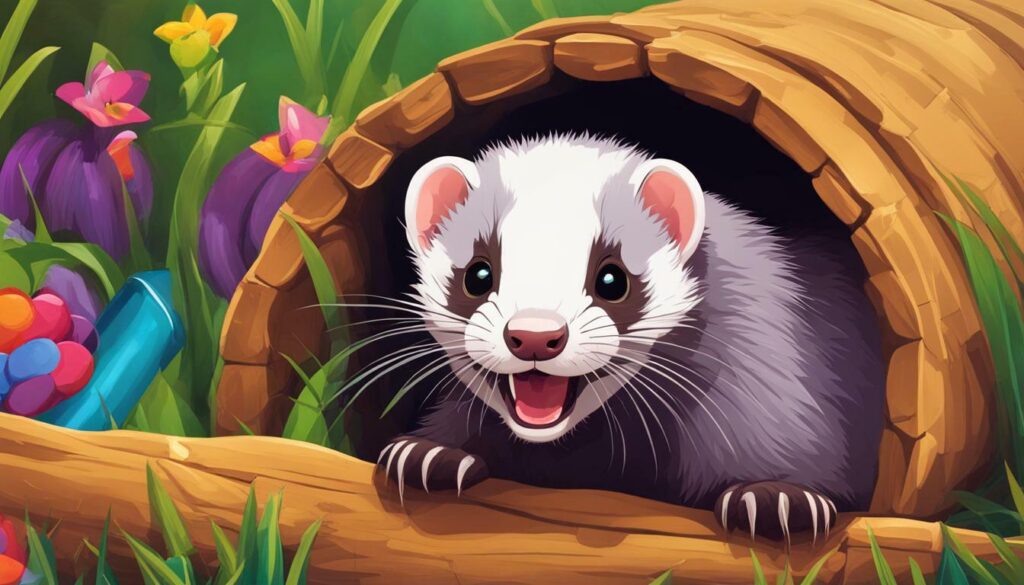Ensuring the health and well-being of your chinchilla is vital, and understanding how to prevent and treat common health issues is key to their long-term happiness. Chinchillas are prone to a variety of health problems, ranging from bite wounds and respiratory diseases to dental issues, gastrointestinal stasis, and reproductive problems. It is important for chinchilla owners to be aware of these potential issues and take proactive measures to keep their furry friends healthy.
Chinchillas can suffer from severe bite wounds, often inflicted during fights or aggressive interactions. Immediate veterinary attention is crucial in such cases to prevent infection and minimize pain and discomfort for the chinchilla. Respiratory diseases, such as pneumonia, can quickly escalate if left untreated, so it is important to recognize the symptoms and seek prompt veterinary care.
One of the unique aspects of chinchilla health is their continuously growing teeth. Without proper wear-down, chinchillas can develop overgrown and impacted teeth, leading to significant pain and difficulty eating. Regular dental check-ups and providing appropriate chew toys are essential in preventing and managing dental problems.
Gastrointestinal stasis and bloat are serious conditions that can be life-threatening for chinchillas. Recognizing the symptoms, such as loss of appetite, bloating, and reduced fecal output, is crucial in seeking immediate veterinary intervention. Diarrhea in chinchillas can be indicative of an underlying health issue, and prompt treatment is necessary to prevent further complications.
Chinchillas are also prone to various skin and fur problems, such as ringworm and fur chewing. Understanding the causes, prevention strategies, and available remedies can help in managing these issues effectively. Additionally, heat stroke is an emergency condition that requires quick action, including immediate cooling and veterinary care, to prevent serious health consequences.
Female chinchillas may experience reproductive problems, such as complications during pregnancy or difficulty giving birth. Recognizing the signs and seeking medical intervention is crucial to ensuring the well-being of both the mother and her offspring.
In conclusion, taking proactive measures to prevent and treat common health issues is essential for the overall well-being of chinchillas. Regular veterinary check-ups, providing a balanced diet, ensuring appropriate environmental conditions, and promptly addressing any health concerns are key to keeping these adorable pets happy and healthy.
- Preventing and treating common chinchilla health issues is crucial for their well-being.
- Common health issues in chinchillas include bite wounds, respiratory diseases, dental problems, gastrointestinal stasis, and reproductive issues.
- Regular veterinary check-ups and proactive care can help prevent and manage these health problems.
- Immediate veterinary attention is necessary for severe bite wounds, respiratory diseases, and emergencies like heat stroke.
- Understanding the symptoms and seeking timely treatment is important for maintaining your chinchilla’s health and happiness.
Chinchillas are susceptible to a range of health issues, including bite wounds, respiratory diseases, dental problems, gastrointestinal stasis, bloat, diarrhea, skin problems, reproductive/genital issues, and heat stroke. These common health issues can significantly impact the well-being of these beloved pets, making it crucial for owners to be aware of preventive measures and available treatments.
Bite wounds are a common health concern for chinchillas, and when severe, they require immediate veterinary attention. Respiratory diseases, such as pneumonia, can develop rapidly and should be treated promptly with antibiotics. Chinchillas have continuously growing teeth, and if they don’t wear down properly, dental problems can arise. Regular veterinary check-ups can help prevent and address dental issues.
Gastrointestinal stasis and bloat are potentially life-threatening conditions that demand immediate veterinary intervention. Diarrhea in chinchillas can be indicative of an underlying health issue and should be treated accordingly. Skin problems, including ringworm and fur chewing, can affect chinchillas and require appropriate prevention strategies and remedies.
Heat stroke is an emergency condition that can occur in chinchillas, especially during hot weather. Recognizing the symptoms and providing immediate cooling and veterinary care is crucial in such cases. Female chinchillas may also experience reproductive problems that necessitate medical intervention.
Overall, regular veterinary check-ups and proactive care are essential for preventing and treating common health issues in chinchillas. By being attentive to their well-being and seeking timely medical attention, owners can ensure the health and happiness of their furry companions.
Common Chinchilla Health Issues
To provide a comprehensive overview of the common health issues in chinchillas, let’s delve into each one in detail.
| Health Issue | Symptoms | Treatment |
|---|---|---|
| Bite Wounds | Visible wounds, bleeding, pain | Immediate veterinary attention |
| Respiratory Diseases | Sneezing, coughing, difficulty breathing | Treatment with antibiotics |
| Dental Problems | Overgrown teeth, difficulty eating | Proper tooth wear-down, veterinary care |
| Gastrointestinal Stasis and Bloat | Loss of appetite, bloating, lethargy | Immediate veterinary intervention |
| Diarrhea | Loose stools, dehydration | Address underlying cause, veterinary treatment |
| Skin and Fur Problems | Hair loss, itching, sores | Preventive measures, targeted remedies |
| Heat Stroke | Excessive panting, weakness, collapse | Immediate cooling, veterinary care |
| Reproductive Problems | Infertility, uterine infections | Medical intervention when necessary |
Remember, being proactive in preventing and addressing these common health issues is key to ensuring the well-being of your chinchilla. By providing proper care and seeking veterinary assistance when needed, you can help your furry friend live a healthy and happy life.
Bite Wounds in Chinchillas: Causes and Treatment
Bite wounds can occur in chinchillas and should be taken seriously, requiring prompt medical attention to prevent further complications. Chinchillas are social animals, but they can become aggressive towards each other, leading to fights and potential injuries. These wounds can be painful and may become infected if not treated promptly.
There are several causes for bite wounds in chinchillas, including territorial disputes, dominance behaviors, or overcrowded living conditions. It is essential to provide sufficient space and resources for each chinchilla to reduce the likelihood of aggression and potential injuries.
If your chinchilla experiences a bite wound, it is crucial to seek veterinary care as soon as possible. The veterinarian will assess the severity of the wound and may prescribe antibiotics to prevent infection. Additionally, they may recommend cleaning the wound and applying topical treatments to aid in the healing process.
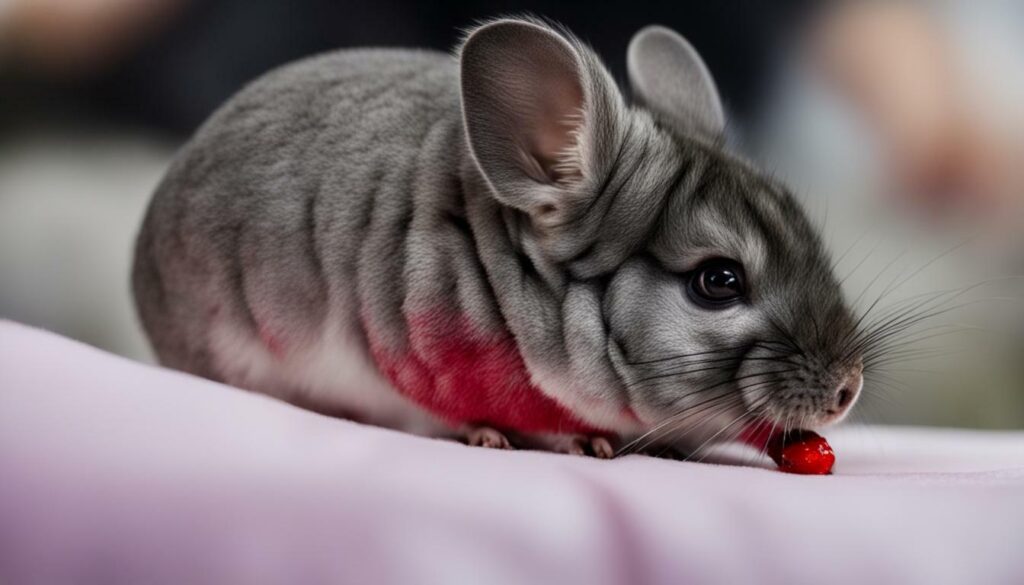
Preventing bite wounds in chinchillas is crucial for their overall well-being. Providing adequate space, appropriate socialization, and individual resources can help reduce the likelihood of aggressive behaviors. Regular veterinary check-ups can also help identify any underlying health issues that may contribute to aggression.
In summary, bite wounds in chinchillas should not be taken lightly. Seeking prompt veterinary attention and taking preventive measures are essential for ensuring the health and happiness of these adorable pets.
Respiratory Diseases in Chinchillas: Recognizing and Managing Symptoms
Respiratory diseases can quickly escalate into pneumonia in chinchillas, making it crucial to identify the symptoms early and take appropriate measures. Chinchillas are prone to respiratory issues, which can be caused by bacterial or viral infections, as well as environmental factors such as poor ventilation or exposure to drafts.
Common symptoms of respiratory diseases in chinchillas include sneezing, coughing, wheezing, nasal discharge, and difficulty breathing. If you notice any of these signs in your chinchilla, it is important to seek veterinary care promptly. A veterinarian will be able to diagnose the specific respiratory condition and prescribe appropriate treatment, typically in the form of antibiotics.
Preventing respiratory diseases in chinchillas starts with maintaining a clean and hygienic environment. Regularly cleaning the cage and ensuring proper ventilation can help minimize the risk of respiratory issues. Additionally, avoiding exposure to smoke, chemicals, and other irritants is important for respiratory health.
| Key Symptoms of Respiratory Diseases in Chinchillas | Treatment |
|---|---|
| Sneezing, coughing, wheezing | Antibiotics prescribed by a veterinarian |
| Nasal discharge | Rest and supportive care |
| Difficulty breathing | Oxygen therapy and medication |
In conclusion, respiratory diseases are a common health issue in chinchillas, and early recognition of symptoms is crucial. By maintaining a clean environment and seeking veterinary care when necessary, you can help protect your chinchilla from respiratory problems. Regular check-ups and vaccinations are also important for maintaining your chinchilla’s overall health and well-being.
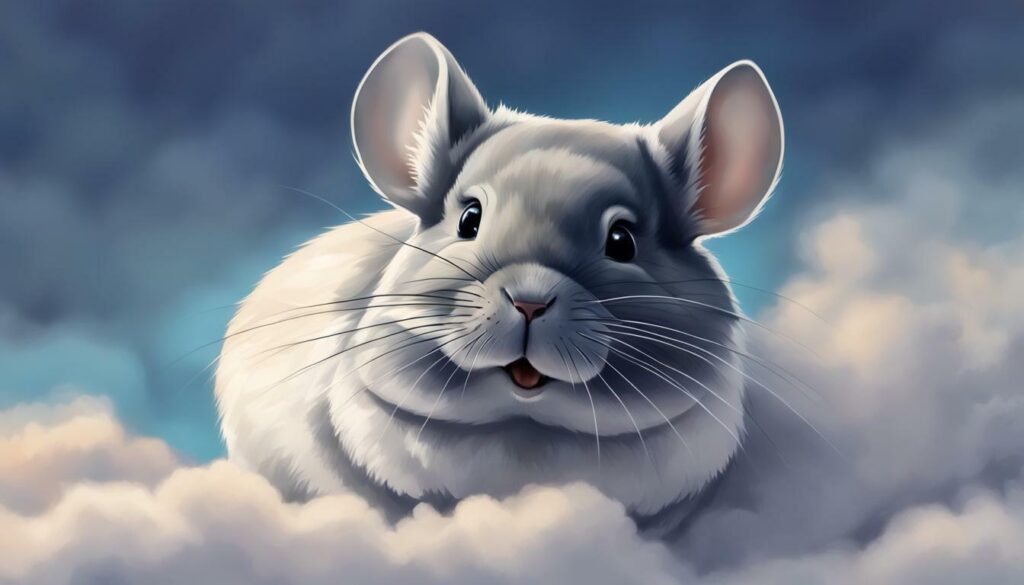
Chinchillas have continuously growing teeth, and without proper wear-down, they can develop dental problems that require prevention and treatment. Dental issues in chinchillas are common and can lead to discomfort, pain, and even difficulty eating. It is crucial for chinchilla owners to take proactive measures to maintain their pet’s dental health.
Preventing dental problems starts with providing a proper diet. Chinchillas should have access to a balanced diet consisting mainly of hay and limited amounts of pellet and fresh vegetables. Chewing on hay helps grind down their teeth and prevents overgrowth. Avoid feeding excessive sugary treats or foods that are high in starch, as they can contribute to dental issues.
In addition to a healthy diet, offering your chinchilla appropriate chew toys is essential. These toys provide mental stimulation and help wear down their teeth naturally. Chew toys made of untreated wood or safe materials can be a great investment to prevent dental problems.
Table: Chinchilla Dental Care
| Prevention | Treatment |
|---|---|
| Provide a balanced diet of hay, pellets, and vegetables | Seek veterinary care for dental issues |
| Offer appropriate chew toys | Professional teeth trimming if required |
| Monitor dental health regularly | Administer prescribed pain medication if necessary |
If you notice any signs of dental problems in your chinchilla, such as decreased appetite, drooling, difficulty chewing, or weight loss, it is crucial to seek veterinary care promptly. A veterinarian experienced in exotic pets can perform a thorough dental examination and address any underlying issues. Treatment for dental problems may include teeth trimming, removal of sharp edges or spurs, and prescribed pain medications if necessary.
Regular dental check-ups should be a part of your chinchilla’s overall healthcare routine. Your veterinarian can assess their dental health, offer professional teeth trimming when needed, and provide guidance on preventative measures. By staying proactive in your chinchilla’s dental care, you can ensure their overall well-being and prevent potential dental issues.
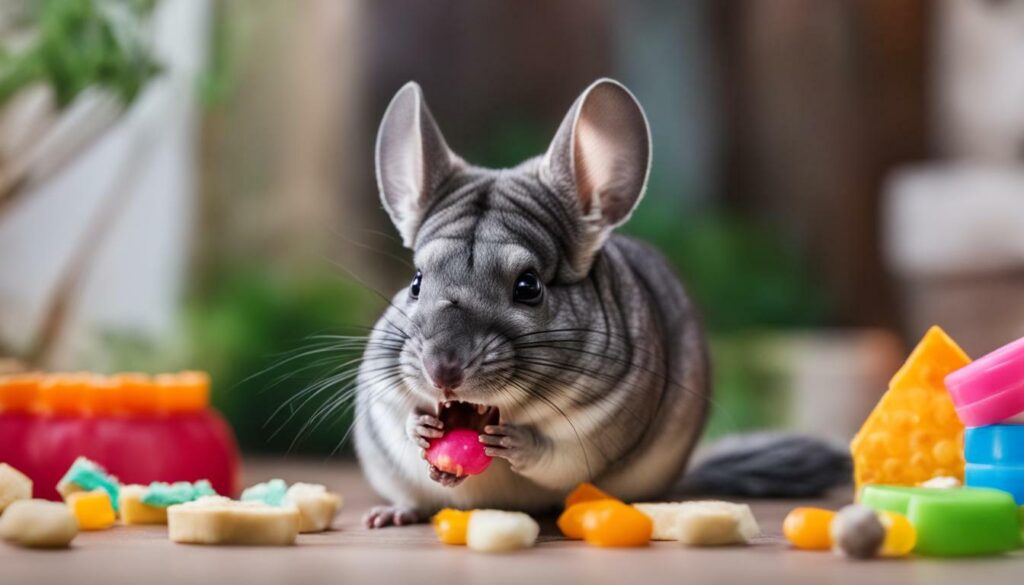
Gastrointestinal stasis and bloat are critical conditions that can endanger a chinchilla’s life, requiring immediate veterinary attention for proper management. Gastrointestinal stasis occurs when a chinchilla’s digestive system slows down or completely stops, leading to a build-up of gas and food within the gastrointestinal tract. This can result in severe pain, discomfort, and potentially life-threatening complications if left untreated.
Bloat, on the other hand, refers to the excessive accumulation of gas in the chinchilla’s stomach and intestines, causing them to become distended. Like gastrointestinal stasis, bloat can be incredibly painful and can quickly escalate into a serious emergency. Both conditions can occur independently or simultaneously, exacerbating the risks involved.
Recognizing the symptoms of gastrointestinal stasis and bloat is crucial in order to seek immediate veterinary intervention. Common signs include a decrease in appetite, reduced or absent fecal output, bloating of the abdomen, lethargy, and discomfort. If your chinchilla shows any of these symptoms, it is essential to act quickly.
When it comes to emergency situations like gastrointestinal stasis and bloat, time is of the essence. Delaying medical attention can lead to further complications, including intestinal blockages, rupture, and even death. Therefore, if you suspect that your chinchilla is experiencing gastrointestinal stasis or bloat, call your veterinarian immediately to seek their guidance and schedule an emergency appointment. Never attempt to treat these conditions at home without professional advice, as the consequences can be severe.
| Symptoms of Gastrointestinal Stasis and Bloat: |
|---|
| Decreased appetite |
| Reduced or absent fecal output |
| Bloating of the abdomen |
| Lethargy |
| Discomfort |
Quick Tips:
- Monitor your chinchilla’s eating habits and fecal output regularly to identify any changes or abnormalities.
- Provide a high-fiber diet consisting of hay and limited amounts of pellets and treats to promote healthy digestion.
- Ensure your chinchilla has access to fresh water at all times to prevent dehydration.
- Keep your chinchilla’s living environment clean and stress-free, as stress can contribute to gastrointestinal issues.
- Regular veterinary check-ups are crucial for early detection and prevention of gastrointestinal stasis and other health issues.
Remember, if you suspect gastrointestinal stasis or bloat in your chinchilla, don’t hesitate to seek immediate veterinary care. Your quick response can make all the difference in ensuring the health and well-being of your furry friend.
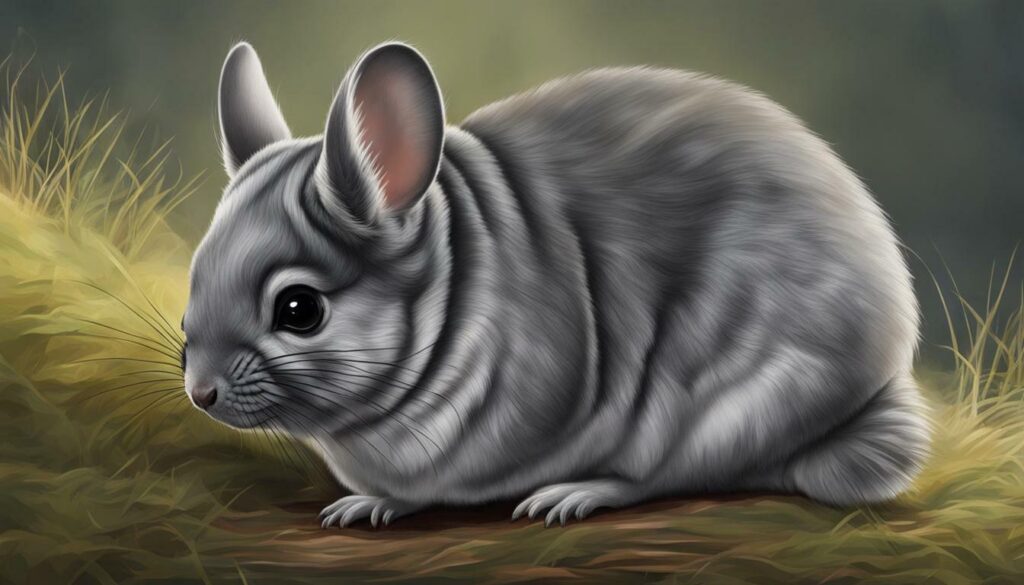
Preventing and treating common chinchilla health issues is essential for the overall welfare of these adorable pets. By staying vigilant and addressing any health concerns promptly, you can help your chinchilla live a happy and healthy life.
Diarrhea in Chinchillas: Understanding Causes and Seeking Treatment
Diarrhea in chinchillas should not be ignored, as it can point to an underlying health problem that requires proper diagnosis and treatment. While occasional loose stools can be normal, persistent or severe diarrhea can be a red flag. It is important to monitor your chinchilla’s stool consistency and seek veterinary attention if you notice any abnormalities.
There are several potential causes of diarrhea in chinchillas. These include dietary changes, improper nutrition, bacterial or viral infections, intestinal parasites, stress, and underlying health conditions. A sudden change in diet, such as introducing new foods too quickly or feeding inappropriate foods, can upset the delicate balance of the chinchilla’s digestive system and result in diarrhea.
When seeking treatment for diarrhea in chinchillas, it is crucial to consult a veterinarian experienced in exotic pet care. The veterinarian will perform a thorough examination, which may include fecal testing to check for parasites or other pathogens. Depending on the underlying cause, treatment may involve dietary modifications, medication to control infection or inflammation, and supportive care such as fluids to correct dehydration.
| Causes of Diarrhea in Chinchillas | Treatment Options |
|---|---|
| Dietary changes | Gradually introduce new foods, provide a balanced diet |
| Infections (bacterial or viral) | Antibiotics or antiviral medication |
| Intestinal parasites | Antiparasitic medication |
| Stress | Identify and remove stressors, provide a calm environment |
| Underlying health conditions | Treatment specific to the underlying condition |
Remember, prevention is always better than cure. Taking steps to maintain a healthy environment, providing a balanced diet, and practicing good hygiene can help prevent diarrhea and other health issues in chinchillas. Regular veterinary check-ups are essential for early detection and prompt treatment of any potential problems.
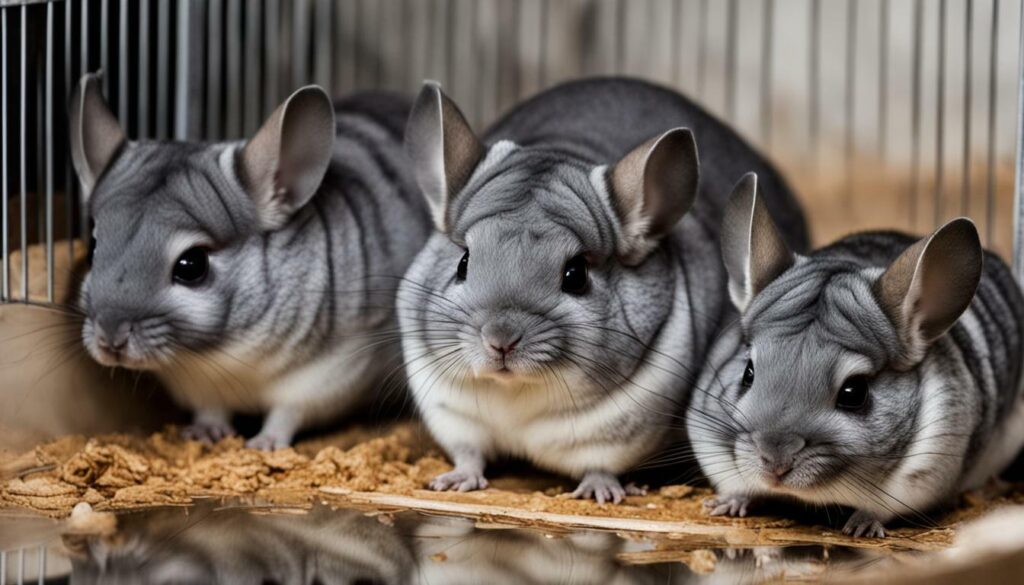
Chinchillas are prone to various skin and fur problems, including ringworm and fur chewing, which can be prevented and managed with the right strategies and remedies. Ringworm is a fungal infection that can cause hair loss, redness, and scaly patches on the skin. It is highly contagious and can spread to other chinchillas and even humans. To prevent ringworm, it is essential to maintain a clean and hygienic environment for your chinchilla. Regularly disinfect their cage and accessories, and avoid contact with infected animals. If your chinchilla develops ringworm, consult a veterinarian for appropriate antifungal treatment.
Fur chewing, on the other hand, is a behavior where chinchillas excessively chew and pull out their fur. It can be caused by stress, boredom, or dental issues. To prevent fur chewing, provide your chinchilla with plenty of mental and physical stimulation. Offer toys, branches, and chew blocks to keep their teeth busy. Additionally, ensure their diet includes enough fiber for proper digestion, as dental problems can contribute to this behavior. If fur chewing persists, consult a veterinarian to rule out any underlying health issues and provide guidance on managing the behavior.
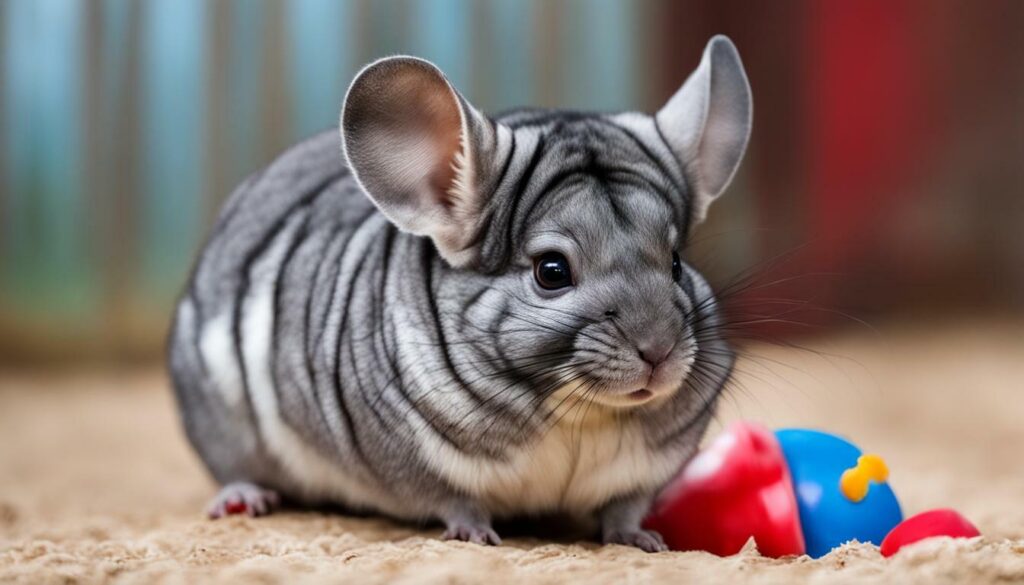
Differentiating Between Ringworm and Fur Chewing
It is essential to differentiate between ringworm and fur chewing to provide the appropriate treatment. Ringworm presents with distinct scaly patches and hair loss, typically found on the head, ears, and limbs. Fur chewing, on the other hand, involves uniform fur loss and damage, usually on the tail and hindquarters. While you can visually inspect your chinchilla for these signs, it is always best to consult a veterinarian for a definitive diagnosis and treatment plan.
In summary, paying attention to your chinchilla’s skin and fur health is crucial for their overall well-being. By following preventive measures and promptly addressing any problems that arise, you can ensure that your furry friend stays happy and healthy.
Heat Stroke in Chinchillas: Recognizing and Responding to Emergency
Heat stroke is a dire emergency for chinchillas, demanding quick action through proper cooling measures and immediate veterinary assistance. Chinchillas are highly sensitive to high temperatures and humidity, making them prone to heat stroke, especially in hot summer months or when housed in environments without proper ventilation or cooling.
Recognizing the signs of heat stroke in chinchillas is crucial for their well-being. Symptoms may include rapid breathing, lethargy, drooling, weakness, disorientation, and even loss of consciousness. If you suspect your chinchilla is suffering from heat stroke, it is essential to act swiftly to prevent further complications.
The first step in responding to a heat stroke emergency is to move your chinchilla to a cool, well-ventilated space. Supplying fresh water for the chinchilla to drink and using a misting bottle or a damp cloth to gently wet their fur can help lower their body temperature. Placing a fan near their enclosure can also aid in cooling them down. However, it is crucial not to immerse your chinchilla in cold water or use ice packs directly on their body, as it can lead to shock.
| Heat Stroke Emergency Response | Do | Don’t |
|---|---|---|
| Move chinchilla to a cool, well-ventilated space | Provide fresh water to drink | Immerse in cold water |
| Use a misting bottle or damp cloth to wet their fur | Place a fan near their enclosure | Use ice packs directly on their body |
| Monitor their breathing and behavior | Contact a veterinarian immediately |
While providing immediate cooling measures, it is essential to contact a veterinarian immediately. Heat stroke can have severe consequences, including organ failure and even death, so professional medical attention is crucial. A veterinarian will be able to assess your chinchilla’s condition, provide appropriate medical treatment, and offer further guidance on prevention and care.
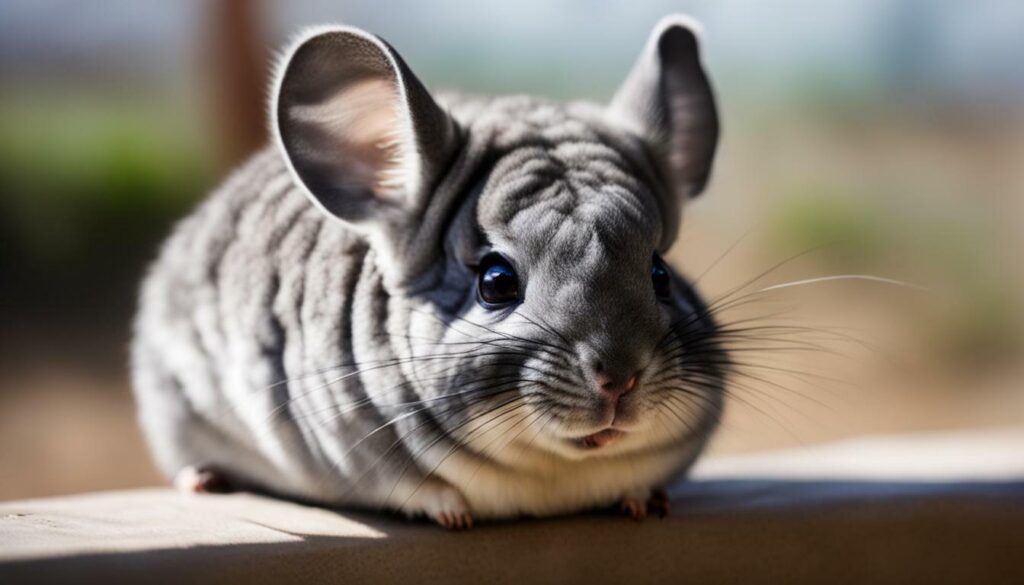
Heat stroke is a life-threatening condition for chinchillas, and recognizing the signs and taking immediate action is vital. By providing proper cooling measures and contacting a veterinarian promptly, you can help save your chinchilla’s life. Remember to take preventive measures to ensure your chinchilla’s environment is cool and well-ventilated, especially during hot weather. Regular veterinary check-ups are also important for monitoring your chinchilla’s health and preventing heat stroke and other health issues.
Reproductive Problems in Female Chinchillas: Seeking Medical Intervention
Female chinchillas can experience reproductive problems that may necessitate medical intervention, highlighting the importance of prompt recognition and appropriate care. These issues can range from complications during pregnancy and birth to uterine infections and hormonal imbalances.
It is crucial for chinchilla owners to be aware of the signs and symptoms of reproductive problems in female chinchillas. These may include prolonged or difficult labor, abnormal vaginal discharge, swollen or painful mammary glands, and changes in behavior or appetite. If any of these symptoms are observed, it is advisable to seek immediate veterinary assistance.
Medical intervention may involve various treatments depending on the specific reproductive issue. This can include antibiotic therapy for infections, surgery to address complications during birth, or hormonal treatments to regulate imbalances. A skilled veterinarian with experience in chinchilla care will be able to provide the necessary diagnosis and treatment plan.
To prevent reproductive problems, it is essential to provide a healthy and stress-free environment for female chinchillas. This includes a balanced diet, adequate exercise, and regular veterinary check-ups. In addition, spaying a female chinchilla at an appropriate age can eliminate the risk of many reproductive issues.
FAQ
Q: What are some common health issues in chinchillas?
A: Common health issues in chinchillas include bite wounds, respiratory diseases, dental problems, gastrointestinal stasis, bloat, diarrhea, skin problems, reproductive/genital issues, and heat stroke.
Q: Are bite wounds in chinchillas serious?
A: Yes, bite wounds can be severe and require immediate veterinary attention.
Q: How should respiratory diseases in chinchillas be treated?
A: Respiratory diseases in chinchillas should be treated with antibiotics to prevent the progression to pneumonia.
Q: What should I know about dental problems in chinchillas?
A: Chinchillas have continuously growing teeth, and dental problems can occur if they don’t wear down properly. Regular veterinary check-ups are important to monitor dental health.
Q: What should I do if my chinchilla has gastrointestinal stasis or bloat?
A: Gastrointestinal stasis and bloat are potentially life-threatening conditions that require immediate veterinary treatment.
Q: What does diarrhea in chinchillas indicate?
A: Diarrhea can indicate an underlying disease in chinchillas and should be addressed by a veterinarian.
Q: How can I prevent and treat skin and fur problems in chinchillas?
A: Preventive measures and appropriate remedies, such as for ringworm and fur chewing, can help address skin and fur problems in chinchillas.
Q: What should I do if my chinchilla experiences heat stroke?
A: Heat stroke is an emergency condition that requires immediate cooling and veterinary care.
Q: Do female chinchillas experience reproductive problems?
A: Yes, reproductive problems can occur in female chinchillas and may require medical intervention.
Q: How important are regular veterinary check-ups for chinchilla health?
A: Regular veterinary check-ups are important for preventing and addressing health issues in chinchillas.






